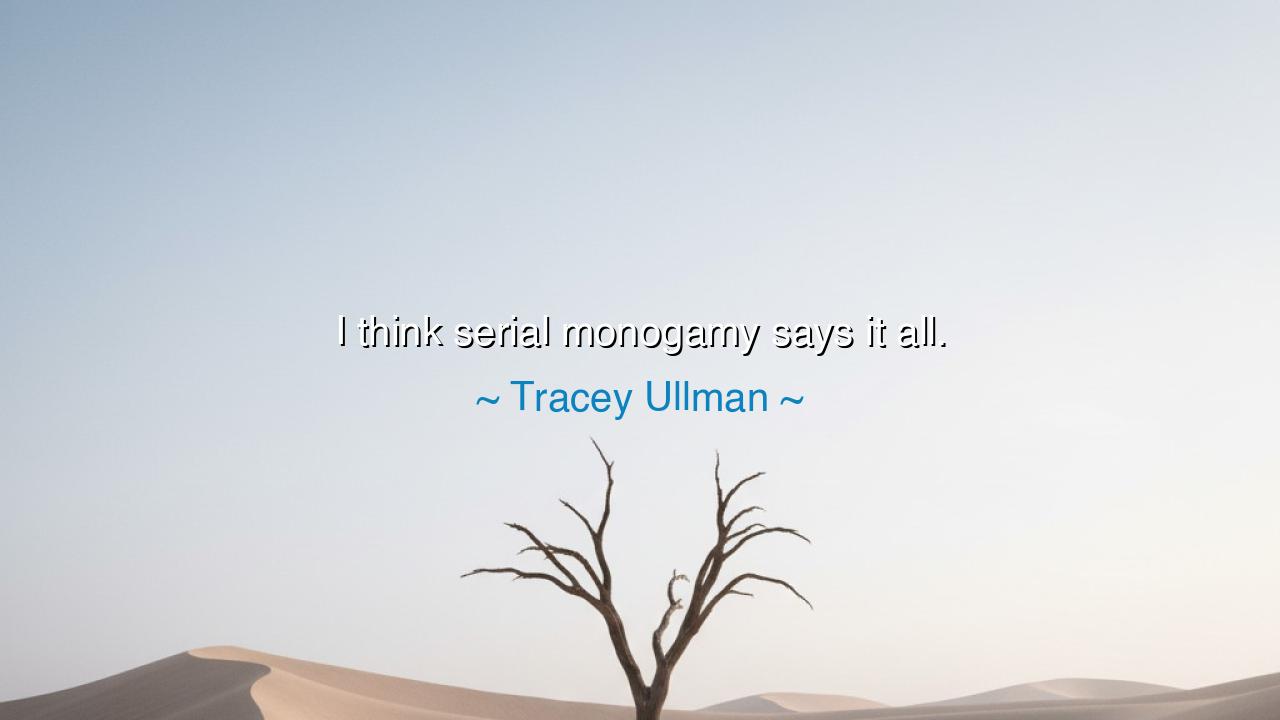
I think serial monogamy says it all.






Gather, O Seekers of Truth, and listen to the wisdom of Tracey Ullman, who speaks of the nature of love and relationships in a world ever-changing. “I think serial monogamy says it all,” she declares, offering a succinct yet profound commentary on the state of human connection. In this simple phrase lies an understanding of the human heart—its complexity, its desires, and the path we walk in search of love. Ullman’s words cut through the layers of social expectations and give voice to a truth that is often veiled: love, in its modern form, is not eternal but is often a cycle, a series of chapters rather than a single, unbroken tale.
Serial monogamy, a term both modern and reflective of our age, suggests a way of loving where one enters into a committed relationship, then leaves it only to begin anew with another. It is not a quest for fleeting moments or shallow attachments, but rather a deeper, sincere connection that can fade, evolve, or expire over time. This cyclical nature of love is a departure from the ancient ideals of eternal bonds—where love was seen as a sacred, indissoluble force, as in the unions of old, where the vow "till death do us part" was sacred and unbroken. But in our time, the story has changed. Relationships are seen as fluid, evolving, and often, temporary, a series of intimate connections woven together by love's impermanent thread.
In the days of our ancestors, relationships were often born from the needs of survival—the need to ensure the tribe, to build alliances, and to continue the line of kin. Marriage was not always the emotional or romantic union we think of today, but rather a contract, a merging of families, and a means of securing prosperity or power. Love, as we understand it now, was often secondary to the practicality of these unions. Yet, as society evolved, so too did our understanding of love. It became more than a duty, more than an arrangement—it became a pursuit of happiness, of fulfillment, of a connection deeper than just mere survival. This shift, however, brings with it challenges, as love becomes more complex, more multifaceted, and less bound by tradition.
The rise of serial monogamy is a testament to the shifting nature of relationships in our time. Just as technology has transformed the way we communicate and connect, so too has it affected the ways in which we love. The internet, with its global reach, has made meeting new people easier than ever, giving rise to what some call "the disposable culture"—where relationships are entered into and exited from with less permanence than in previous eras. And in this world, the idea of "serial monogamy" speaks to a cycle of connection and separation. We love, we grow, we part, and we begin again.
Consider, O Seekers, the tale of King Solomon, who, though wise beyond measure, had many wives. While his marriages were meant to secure his reign and bring him peace, they were, at their core, symbols of what might be called serial monogamy in their own time. For each union, though deeply meaningful, was bound by its time and purpose. When those purposes were no longer fulfilled, Solomon moved on, seeking to find greater fulfillment elsewhere. His story mirrors the modern experience, where love can be rich and deep but is not necessarily meant to last forever. The cycles of his heart echo the cycles we experience in our own lives, and in this, we see both the wisdom and the challenges of the modern pursuit of love.
In the world today, each relationship is a lesson—a reflection of the heart's growth, its desires, and its inevitable transformations. We learn from each connection, each chapter of love, and take those lessons into the next. And while some may view serial monogamy as a failure of commitment, we might instead see it as a testament to the fluidity of human emotion and the courage to seek new experiences, to grow beyond the boundaries of the past. Each union, however temporary, offers us the chance to discover new facets of ourselves, to push past the limits of old beliefs, and to become more fully who we are meant to be.
Thus, O Seekers, let us embrace the truth of serial monogamy not as a failure of love but as an opportunity for renewal and growth. In each relationship, we find lessons of patience, understanding, and forgiveness—both for our partners and for ourselves. When we look upon each love with gratitude, knowing that its time has come and gone, we honor not only the connection but also the wisdom that arises from its impermanence. Let us move forward, understanding that in the dance of love, we are all learning, growing, and evolving.
In the end, let us not fear the cycles of love, nor the passages of time that shape our hearts. Let us cherish the moments, the lessons, and the growth that each union brings. As Tracey Ullman so wisely teaches, we are all part of an ever-evolving story, one chapter leading into the next, each one richer for having been lived. So, love deeply, love honestly, but never forget that the path of love is one of constant transformation, and in that transformation, we find our greatest wisdom.






AAdministratorAdministrator
Welcome, honored guests. Please leave a comment, we will respond soon